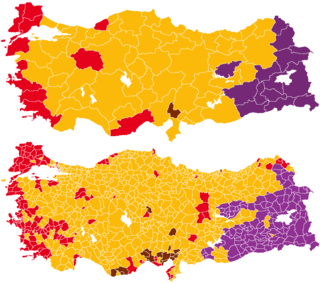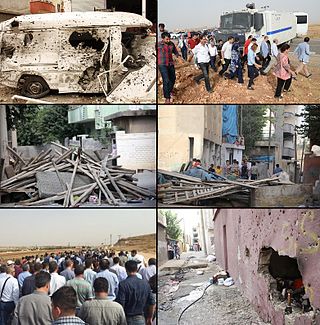
Selahattin Demirtaş is a Turkish politician and author of Zaza origin. He was the co-leader of the left-wing pro-Kurdish Peoples' Democratic Party (HDP), serving alongside Figen Yüksekdağ from 2014 to 2018. Selahattin Demirtaş announced that he left politics after the May 2023 elections.

Presidential elections were held in Turkey on 10 August 2014 in order to elect the 12th President. Prime Minister Recep Tayyip Erdoğan was elected outright with an absolute majority of the vote in the first round, making a scheduled run-off for 24 August unnecessary.

General elections were held in Turkey on 7 June 2015 to elect 550 members to the Grand National Assembly. This was the 24th general election in the history of the Turkish Republic, electing the country's 25th Parliament. The result was the first hung parliament since the 1999 general elections. Unsuccessful attempts to form a coalition government resulted in a snap general election being called for November 2015.

Local elections were held in Turkey on 30 March 2014, with some repeated on 1 June 2014. Metropolitan and district mayors as well as their municipal council members in cities, and muhtars and "elderly councils" in rural areas were elected. In light of the controversy around the elections, it was viewed as a referendum on the government of Prime Minister Recep Tayyip Erdoğan. About 50 million people were eligible to vote.

The Peoples' Democratic Party, or Democratic Party of the Peoples, is a pro-Kurdish political party in Turkey. Generally left-wing, the party places a strong emphasis on participatory and radical democracy, feminism, minority rights, youth rights, and egalitarianism. It is an associate member of the Party of European Socialists (PES), a consultative member of the Socialist International, and a party within the Progressive Alliance (PA).
In the run-up to the Turkish general election of June 2015, many political parties engaged in campaign efforts to increase their vote shares. The main contesting parties were the governing incumbent Justice and Development Party (AKP) led by Ahmet Davutoğlu, the Republican People's Party (CHP) led by Kemal Kılıçdaroğlu, the Nationalist Movement Party (MHP) led by Devlet Bahçeli and the Peoples' Democratic Party (HDP) co-led by Selahattin Demirtaş and Figen Yüksekdağ. These four parties are the only parties with a realistic chance of surpassing the 10% parliamentary threshold to gain representation in the Grand National Assembly of Turkey
In the run-up to, during and after the Turkish general election of June 2015, numerous accusations of electoral fraud and violence were made by opposition parties. Electoral fraud in Turkey has usually been most extensive during local elections, where individual votes have significantly larger impact in determining local administrations. Although the 2014 presidential election saw little evidence of electoral misconduct, issues regarding voter records as well as extensive media bias have been controversial issues that have remained largely unaddressed. In both the local and presidential elections in 2014, several voters reported that ballot papers had been sent to addresses that are wrong or do not exist as well as voters that have been dead for a substantial amount of time.
The following article documents the issues and developments that have formed the basis of the political campaigns and the news agenda in the run-up to the June 2015 general election and the November 2015 general election.

General elections were held in Turkey on 1 November 2015 to elect 550 members to the Grand National Assembly. They were the 25th general elections in the History of the Republic of Turkey and elected the country's 26th Parliament. The election resulted in the Justice and Development Party (AKP) regaining a parliamentary majority following a 'shock' victory, having lost it five months earlier in the June 2015 general elections.

The Suruç bombing was a suicide attack by the Turkish sect of Islamic State named Dokumacılar against Turkish leftists that took place in the Suruç district of Şanlıurfa Province in Turkey on 20 July 2015, outside the Amara Culture Centre. A total of 34 people were killed and 104 were reported injured. Most victims were members of the Socialist Party of the Oppressed (ESP) Youth Wing and the Socialist Youth Associations Federation (SGDF), university students who were giving a press statement on their planned trip to reconstruct the Syrian border town of Kobanî.
The 2015 Diyarbakır rally bombings occurred on 5 June 2015 in Diyarbakır, Turkey, during an electoral rally of the Peoples' Democratic Party (HDP) at 17:55 local time. The bombing took place two days before the June 2015 general election and killed 5 supporters, injuring over 100. A suspect known to be close to ISIL was arrested on June 6 in Gaziantep. By August, suspicions as for the perpetrators had continued to lie on ISIL.

On 10 October 2015 at 10:04 local time (EEST) in Ankara, the capital city of Turkey, two bombs were detonated outside Ankara Central railway station. With a death toll of 109 civilians, the attack surpassed the 2013 Reyhanlı bombings as the deadliest terror attack in Turkish history. Another 500 people were injured. Censorship monitoring group Turkey Blocks identified nationwide slowing of social media services in the aftermath of the blasts, described by rights group Human Rights Watch as an "extrajudicial" measure to restrict independent media coverage of the incident.

The Peoples' Democratic Party election campaign of June 2015 was the official election campaign of the Peoples' Democratic Party (HDP) for the June 2015 general election in Turkey. the campaign was dominated by the party's co-leader Selahattin Demirtaş. It was the first time a pro-Kurdish party contested a general election as a political party rather than as independent candidates since the 2002 general election and the first time such a party won representation in Parliament.

The 2015–2016 Şırnak clashes were a series of armed clashes in the southeastern Şırnak province, between Turkish government forces and Kurdish armed groups, as part of the Turkish–Kurdish conflict.

The Turkish local elections of 2019 were held on Sunday 31 March 2019 throughout the 81 provinces of Turkey. A total of 30 metropolitan and 1,351 district municipal mayors, alongside 1,251 provincial and 20,500 municipal councillors were elected, in addition to numerous local non-partisan positions such as neighbourhood representatives (muhtars) and elderly people's councils.

A constitutional referendum was held in Turkey on 16 April 2017 on whether to approve 18 proposed amendments to the Turkish constitution that were brought forward by the governing Justice and Development Party (AKP) and the Nationalist Movement Party (MHP). As a result of its approval, the office of Prime Minister was abolished and the existing parliamentary system of government was replaced with an executive presidency and a presidential system. The number of seats in Parliament was raised from 550 to 600, while, among a series of other proposals, the president was given more control over appointments to the Supreme Board of Judges and Prosecutors (HSYK). The referendum was held under a state of emergency that was declared following the failed military coup attempt in July 2016.
The Nation Alliance, abbreviated as NATION, was an electoral and political alliance in Turkey, made up of six opposition parties to contest the 2023 Turkish general election against its main rival, the People's Alliance. Originally established prior to the country's 2018 general election, the alliance had consisted of four opposition parties across the political spectrum, which had found common ground on withstanding Turkey's newly established presidential system. The alliance dissolved in 1 June 2023 following its narrow defeat in the 2023 elections, after the Good Party's announcement that they were no longer a part of it.
The Ceylanpınar incident saw the killing of two policemen in Ceylanpınar, Turkey, which led to the resumption of the Kurdish-Turkish conflict. The attack was used by the Justice and Development Party (AKP) government as a casus belli to end the 2013-2015 solution process and resume its war against the Kurdistan Workers' Party (PKK). As the AKP had failed to win a majority in the June 2015 Turkish general election the month before, and soon after the resuming hostilities announced the November 2015 Turkish snap general election, analysts believe that the Ceylanpınar killings and return to war have been used to increase Turkish nationalist fervor and favored the ruling party taking back control over the Turkish parliament. Other motives have also been advanced, with the Syrian war encouraging extremist parties from both sides to undermine peace efforts by increasing nationalism and readiness for war.

The June 2019 Istanbul mayoral election was held on 23 June 2019. It was a repeat of the March 2019 mayoral election, which was annulled by the Supreme Electoral Council (YSK) on 6 May 2019. The original election had resulted in a narrow 0.2% margin of victory for opposition candidate Ekrem İmamoğlu, causing the governing Justice and Development Party to successfully petition for a by-election.
Turkish–Islamic synthesis is a type of Turkish nationalism which has an Islamist leaning instead of secular.


















